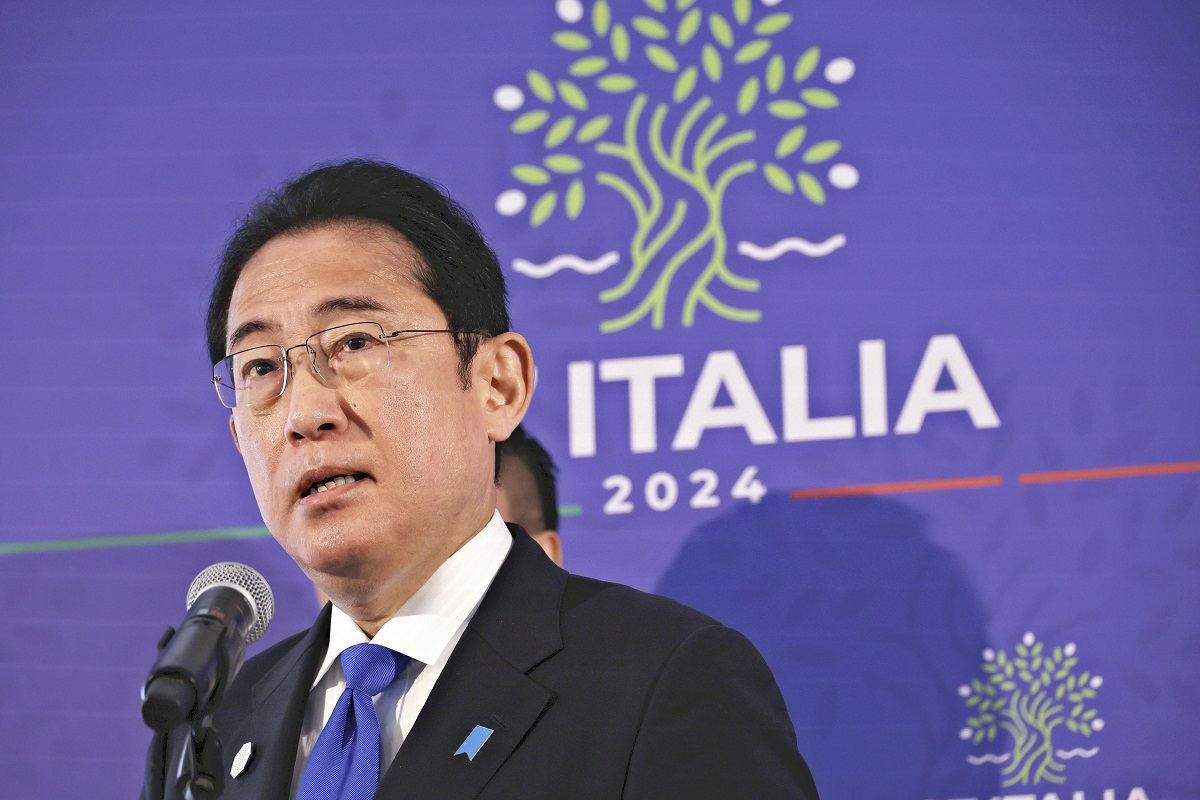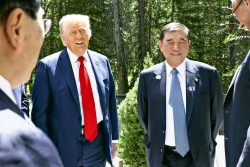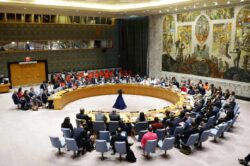Japan Prime Minister Stresses Diplomatic Achievements at G7; Domestic Issues Grow Increasingly Difficult to Handle

Prime Minister Fumio Kishida answers questions from reporters after the Group of Seven summit in Apulia, southern Italy, on Saturday afternoon.
20:00 JST, June 16, 2024
GROTTAGLIE, Italy — Prime Minister Fumio Kishida made his presence felt in discussions on economic security and other issues at the Group of Seven summit held Thursday and Friday in Italy, building on his achievements from the previous G7 gathering in Hiroshima.
Kishida hopes to emphasize his track record in diplomacy, an area in which he excels, but Japan’s domestic affairs are increasingly difficult to handle. This week’s Diet deliberations will be crucial for the prime minister, as discussions are expected to be heated over such issues as a bill to revise the Political Funds Control Law.
“We were able to carry on the results from the Hiroshima G7 summit to the latest gathering. It was a meaningful summit,” Kishida said to reporters, stressing his diplomatic achievements at an airport in Apulia, southern Italy, on Saturday afternoon.
Kishida served as a lead speaker at a session about Indo-Pacific and economic security on Friday. He delivered an opening statement for the session and brought up issues such as the increased military cooperation between Russia and North Korea and China’s restrictions on the exports of important minerals, such as gallium, used to make semiconductors.
The G7 Leaders’ Communique criticized the military cooperation between Russia and North Korea and called on China to refrain from adopting export control measures.
After the discussions, European Commission President Ursula von der Leyen praised Kishida’s contributions, saying that economic security issues came into the spotlight after Japan brought them up at the previous year’s summit in Hiroshima.
The G7 summit in Italy was attended by the same dignitaries as the Hiroshima gathering, where Kishida served as chair. “Kishida was able to delve deep into discussion topics from the beginning because the members knew each other well,” an official accompanying the prime minister said.
One of the leaders who attended the G7 summit praised Kishida as being the first leader in Asia to speak against Russia’s invasion of Ukraine and make it a global issue. Others said Kishida’s speech to the U.S. Congress in April appeared to have helped the U.S. Congress pass a foreign-aid package for Ukraine and other regions.
Kishida served four years and seven months as foreign minister, the second longest tenure in postwar Japan. “The harder he works in the field of diplomacy, the more energetic he becomes,” an aide close to Kishida said.
Kishida, who is also the president of the ruling Liberal Democratic Party, was set to return to Japan on Sunday and put all his efforts into handling Diet affairs. With one week left until the end of the current Diet session on June 23, discussions on political reform and the handling of a no-confidence motion against the Kishida Cabinet will be focal issues.
Political party leaders will hold a parliamentary debate session for the first time under Kishida’s Cabinet on Wednesday. The opposition Constitutional Democratic Party of Japan is increasingly confrontational toward the government and plans to submit a no-confidence motion against the Cabinet.
CDPJ Secretary General Katsuya Okada said to reporters Saturday in Tsu, “The entire Cabinet should resign or the House of Representatives should be dissolved.” The CDPJ will make a final decision on the motion based on upcoming Diet deliberations and the debate between party leaders.
Another uncertain factor is how Nippon Ishin (Japan Innovation Party ) will deal with the Political Funds Control Law revision bill submitted to the lower house by the LDP. Ishin supported the bill in the lower house burt suggested that it might vote against the bill in the House of Councillors unless the reform of a monthly allowance for lawmakers, which Kishida and Ishin leader Nobuyuki Baba agreed on, is realized during the current Diet session.
The allowance is given to lawmakers for research, study, public relations and accommodations and was formerly known as document, correspondence, travel and accommodation expenses.
Resolving the issue “all comes down to Kishida’s decision,” a senior LDP member said.
“I will continue to make every effort to pass the revision bill,” Kishida told reporters. As for the allowance in question, he said, “I want to handle the issue according to the agreement with Ishin in a cordial way.”
Top Articles in Politics
-

Japan PM Takaichi’s Cabinet Resigns en Masse
-

Sanae Takaichi Elected Prime Minister of Japan; Keeps All Cabinet Appointees from Previous Term
-

Japan’s Govt to Submit Road Map for Growth Strategy in March, PM Takaichi to Announce in Upcoming Policy Speech
-

LDP Wins Historic Landslide Victory
-

LDP Wins Landslide Victory, Secures Single-party Majority; Ruling Coalition with JIP Poised to Secure Over 300 seats (UPDATE 1)
JN ACCESS RANKING
-

Japan PM Takaichi’s Cabinet Resigns en Masse
-

Japan Institute to Use Domestic Commercial Optical Lattice Clock to Set Japan Standard Time
-

Israeli Ambassador to Japan Speaks about Japan’s Role in the Reconstruction of Gaza
-

Man Infected with Measles Reportedly Dined at Restaurant in Tokyo Station
-

Videos Plagiarized, Reposted with False Subtitles Claiming ‘Ryukyu Belongs to China’; Anti-China False Information Also Posted in Japan






















